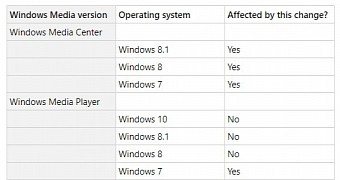Microsoft is quietly making a change to Windows Media Center and Windows Media Player on Windows 7, Windows 8, and Windows 8.1, and unsurprisingly, many see this as an effort to push more users to Windows 10.
With Windows 7 projected to reach the end of support in January 2020, every such change could easily be misinterpreted, especially when Microsoft doesn’t provide too many details about its decision.
For example, the company has recently announced that new metadata wouldn’t be updated in Windows Media Player and Media Center on Windows 7, 8, and 8.1, explaining that the only OS not affected by this is Windows 10.
You can just upgrade to Windows 10
However, the company explains that this decision comes after analyzing usage data, which means that Microsoft sees no reason to keep the service running only for a small number of users.
“Going forward, you may be unable to view information (metadata) such as the title, genre, and artist for songs, and the director, actors, cover art, and TV guide for movies in Windows Media Center and Windows Media Player,” Microsoft explains in a technical support document (via WL).
“After looking at customer feedback and usage data, Microsoft decided to discontinue this service. This means that new metadata won’t be updated on media players that are installed on your Windows device. However, any information that’s already been downloaded will still be available. “
Windows 7 has already entered its last 12 months of support, so beginning with January 2020, it’s considered a retired product and no other patches and security fixes would be shipped.
Microsoft obviously recommends customers to upgrade to Windows 10, emphasizing that sticking with an obsolete operating system exposes the data and open computers to risks of cyber-attacks. For now, Windows 7 remains the second most popular desktop operating system with more than 35 percent market share.

 14 DAY TRIAL //
14 DAY TRIAL //